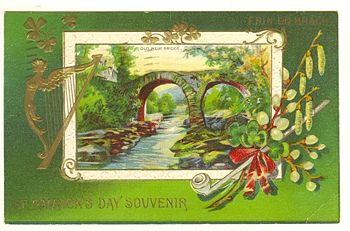CGOM-UK, “Patrick was Not Roman Catholic”

Postcard from 1912 Honoring “St. Patrick’s Day”
Because of its conflict with Easter observances, some Catholics have decided that today or tomorrow should be celebrated as “St. Patrick’s Day” (please see news item St. Patrick’s Day: Should it Be Observed At All? for more information).
James McBride of CGOM-UK sent me the following information he found related to Patrick:
There is another fact that proves that Patrick was not Roman Catholic. He worshipped on a different day than what the Roman Catholics worship on! Historically, the Celtic church observed the seventh day of the week in accordance with Holy Writ. A professor of church history at Princeton wrote, “It seems to have been customary in the Celtic churches of early times, in Ireland as well as Scotland, to keep Saturday, the Jewish Sabbath, as a day of rest from labor. They obeyed the fourth commandment literally upon the seventh day of the week.” Professor James C. Moffat, The Church in Scotland, p. 140. Another historian wrote, “We seem to see here an allusion to the custom, observed in the early monastic Church of Ireland, of keeping the day of rest on Saturday.” Blair’s, History of the Church in Scotland, Vol. 1, p. 86. (This quote is found in a footnote of Blair’s translaton of the Catholic historian, Bellesheim).
The Catholic historian, Bellesheim, also states the sentiments of Queen Margaret, for he wrote, “The queen further protested against the prevailing abuse of Sunday desecration. ‘Let us’ she said, ‘venerate the Lord’s day, inasmuch as upon it our Saviour rose from the dead: let us do no servile work on that day’…The Scots in this matter had no doubt kept up the traditional practice of the ancient monastic Church of Ireland, which observed Saturday rather than Sunday as a day of rest.” Bellesheim, History of the Catholic Church of Scotland, vol. 1, pp. 249,250.
William Skene wrote, “Her next point was that they did not duly reverence the Lord’s day, but in this latter instance they seem to have followed a custom of which we find traces in the early monastic Church of Ireland, by which they held Saturday to be the Sabbath on which they rested from all their labors.” William F. Skene, Celtic Scotland, vol. II, p. 349. (1877)
There was a great missionary student of Patrick’s schools in Ireland by the name of Columba, “the son of Feidlimyd, the son of Fergus.” J.H. Merle d’Aubigne, The Reformation in England, vol.1, p. 30.He was born in Donegal, Ireland, in 521 A.D., and was sent to Scotland as a missionary. “‘I will go’ said he, ‘and preach the Word of God in Scotland.'” Ibib, p. 30. Columba also kept the Bible Sabbath or Saturday which God commands in His decalogue. His last moments are recorded in history. “Having continued his labors in Scotland thirty-four years, he clearly and openly foretold his death, and on Saturday, the ninth of June, he said to his disciple Diermit: ‘This day is called the Sabbath, that is, the day of rest, and such will it truly be to me; for it will put an end to my labors.'” Butler, Lives of the Saints, vol. 6, p. 139.
History is very clear on the origin of Patrick and the day that he kept as the Sabbath, but let us go to the Holy Scriptures and find out WHY Patrick and the early Celtic Church kept the seventh day or Saturday as God’s holy rest!“It was the Sabbath among the Briton Christians 596-664, and then was still so with those who withdreww to the Isle of Iona and to Ireland rather than to submit to the laws commanding and enforcing Sunday observance.” Alonzo T. Jones, Lessons From the Reformation, p. 360.
Detailed history reveals that “In A.D. 664, Oswald, king of Northumberland, ordered Sunday observance. And the Sabbath keepers, ‘rather than to submit to it,’ withdrew to the Isle of Iona and to Ireland.” Ibid, p. 319. The Celtic Church fled from Sunday observance!
While I am not claiming that all the information above is certain (most early history exists in sketchy pieces), I do believe that what is now called St. Patrick’s Day is not to be celebrated by true Christians.
It should be noted, however, that history does certainly show that the Catholic Church was disappointed to learn early on that the British Isles (including Ireland) held to practices closer to those of the original apostles than the Roman Church (please see the article The Pergamos Church Era).
Those interested in more on “St. Patrick’s Day” may wish to read the article Why The Church of God Does Not Wear Green on St. Patrick’s Day.
 |
Tweet |
|